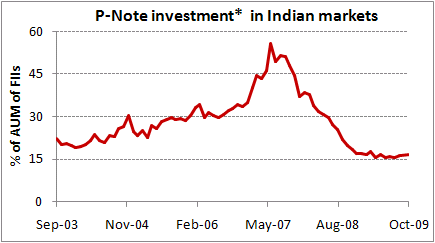Category: Global Economy Sub-category: Indian Economy
Document type: news
Participatory notes are all set to die a slow death with the government refusing to relent on its proposals to tax them.
The Finance ministry has told foreign institutional investors (FIIs), which sells P-notes to their overseas clients, that any short-term gains on these instruments would be taxed in India.
Further, FIIs have been advised to pass on the post-tax gains to their P-notes clients. This means that tax impact will have to be ultimately borne by the P-note holder.

Finance minister, is expected to clarify on this on May 7, 2012 when he replies to the Budget debate in Parliament.
This incident could mark an end to the issuance of P-notes. Most of FIIs have already stopped selling P-notes, also known as offshore derivative instruments (ODIs), after the General Anti-avoidance Rules (GAAR) were announced in the Budget.
The government, some time back had liberalised rules for investment in the Indian equities market by permitting a new class of investors - qualified foreign investors (QFIs) - to invest in India. QFIs comprise foreign individuals, foreign pension funds and foreign trusts, and can invest directly in stocks and mutual funds.
ODIs would over time give way to QFIs. For ODIs, the finance ministry would clarify that the obligation to deduct tax, at the time of the holder redeeming the ODI, will be on the FII.
However, the FIIs opposed the view as they said that such a proposal will kill the ODI product.
FIIs have also met finance ministry officials several times in the past month to present their views on GAAR.
To ease concerns of FIIs, the finance minister announced last month that ODI holders will not be required to pay taxes in India, and that the income-tax department shall examine the tax liability of the FIIs, virtually putting the onus of tax deduction on the FIIs.
External links:
Participatory notes (PNs / P-Notes) are instruments used by investors or hedge funds that are not registered with the SEBI (Securities & Exchange Board of India) to invest in Indian securities. Participatory notes are instruments that derive their value from an underlying financial instrument such as an equity share and, hence, the word, 'derivative instruments'. SEBI permitted FIIs to register and participate in the Indian stock market in 1992.
Foreign Institutional investors are organizations which pool large sums of money and invest those sums in securities, real properties and other investment assets. They can also include operating companies which decide to invest their profits to some degree in these types of assets.
-









